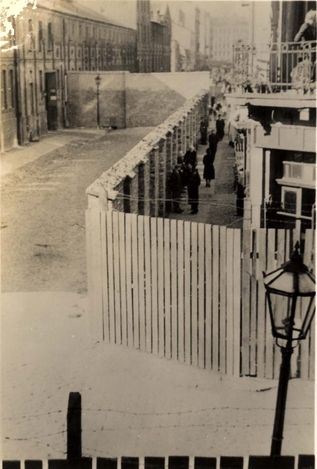Tuesday 19 November 1939
 |
| Heinkel He 177 V1. |
Battle of the Atlantic: More ships are sunk by the magnetic mines dropped by Kriegsmarine destroyers, but the U-boats have a big day.
U-35 (Kptl. Heinz Scheringer) torpedoes and sinks 793-ton British merchant Bowling near the Outer Farne Islands in the North Sea. All thirteen crew perish.
U-41 (Kapitänleutnant Gustav-Adolf Mugler) torpedoes and sinks the 1,351-ton British freighter Darino near Spain. Eleven survive, picked up by the U-boat and transferred to an Italian steamer, and sixteen perish. It turned into extremely long and tedious stalking, as the U-boat fired three torpedoes over eight hours that all missed or malfunctioned. Finally, at 01:50, a fourth hits.
U-49 (Kapitänleutnant Kurt von Gossler) torpedoes and sinks 4,258-ton British freighter Pensilva near Spain. U-49 has been stalking convoy HG 7 out of Durban for three hours before it gets the right opening. Again, two torpedoes miss, but the third does hit the ship.
U-57 (Kapitänleutnant Claus Korth) torpedoes and sinks 1,383-ton British freighter Stanbrook in the North Sea. All 20 crew perish.
British ship Torchbearer hits a magnetic mine and sinks.
Kriegsmarine minesweeper M-132 is accidentally damaged by depth charges and, after being beached, is a total loss.
Convoy HG 9 leaves Port Said for Liverpool.
European Air Operations: Flights of Luftwaffe planes are spotted both in the southeast and near the Firth of Forth.
German Opposition: Rumors are running wild about the actions taken against the students in Prague. Up to 120 Czech students and teachers are claimed to be killed, with another 50,000 people arrested. It is all just rumor and conjecture, there are no hard facts being reported by any media sources.
British Government: First Lord of the Admiralty Churchill, wishing to retaliate for the success of the German magnetic mines, proposes using aircraft to drop mines in the Rhine between Strasbourg and the Lauter River and around the Ruhr stretch of the river. He wishes to make the former mines time-activated so they will float downstream and then blow up in the busiest section of the Rhine.
Luftwaffe: The prototype Heinkel He 177 V1, the Luftwaffe's only four-engine bomber (in two nacelles feeding only two propellers), makes its maiden flight. The flight must be cut short because of overheating engines.
Dutch/Belgian/German Relations: The Dutch and Belgians protest at incursions of their airspace by the Luftwaffe.
Japanese/Soviet Relations: Molotov signs an agreement with the Japanese ambassador to establish a commission to fix the border of Manchukuo, where the two nations recently clashed at Khalkin Gol.
China: Chiang Kai-Shek renews his quest for a Winter Offensive against the Japanese despite recent setbacks along the coast.
 |
| Warsaw Ghetto Fencing. |
The cornerstone ceremony is held for the FDR Library in Hyde Park, New York. It is the first Presidential Library. He places a "time capsule" inside. Despite his physical condition, FDR stands for the ceremony.
November 1939
November 1, 1939: The Jet Flies AgainNovember 2, 1939: The Soviets Devour Poland
November 3, 1939: Amending the Neutrality Act
November 4, 1939: Roosevelt Signs Neutrality Laws
November 5, 1939: The Spirit of Zossen
November 6, 1939: First Dogfight
November 7, 1939: More Lies About SS Athenia
November 8, 1939: Hitler Almost Killed
November 9, 1939: The Venlo Incident
November 10, 1939: Dutch Panic
November 11, 1939: Poignant Armistice Day
November 12, 1939: Peace Efforts Made and Rejected
November 13, 1939: First Bombing of Great Britain
November 14, 1939: The Dyle Plan
November 15, 1939: Elser Confesses to the Bürgerbräukeller Bombing
November 16, 1939: Martial Law in Prague
November 17, 1939: International Students Day
November 18, 1939: Magnetic Mines
November 19, 1939: Walls Around the Warsaw Ghetto
November 20, 1939: First RN Submarine Victory
November 21, 1939: Salmon & Gluckstein on the Prowl
November 22, 1939: British Recover A Magnetic Mine
November 23, 1939: HMS Rawalpindi Sunk
November 24, 1939: Japanese Enter Nanning
November 25, 1939: The Olympics are a War Casualty
November 26, 1939: Soviets Stage an "Incident" at Mainila
November 27, 1939: German Marriage Becomes Perilous
November 28, 1939: Judenrats in Poland
November 29, 1939: The Soviets Prepare to Invade Finland
November 30, 1939: Winter War Begins
2019



